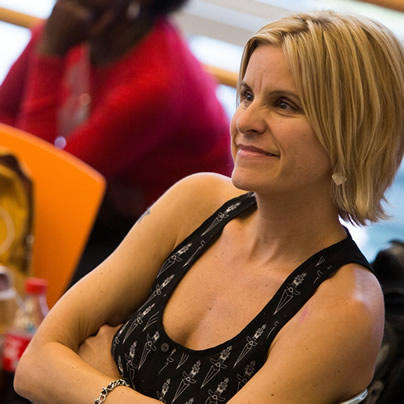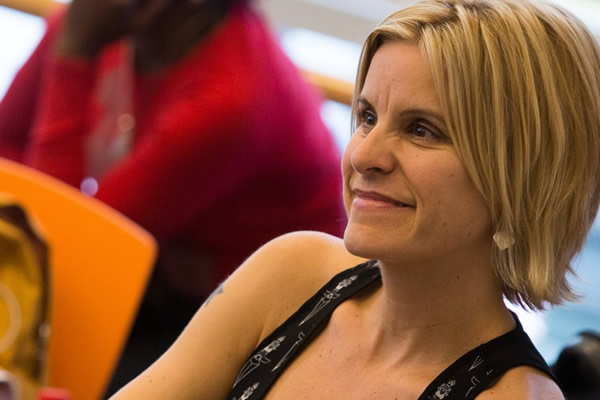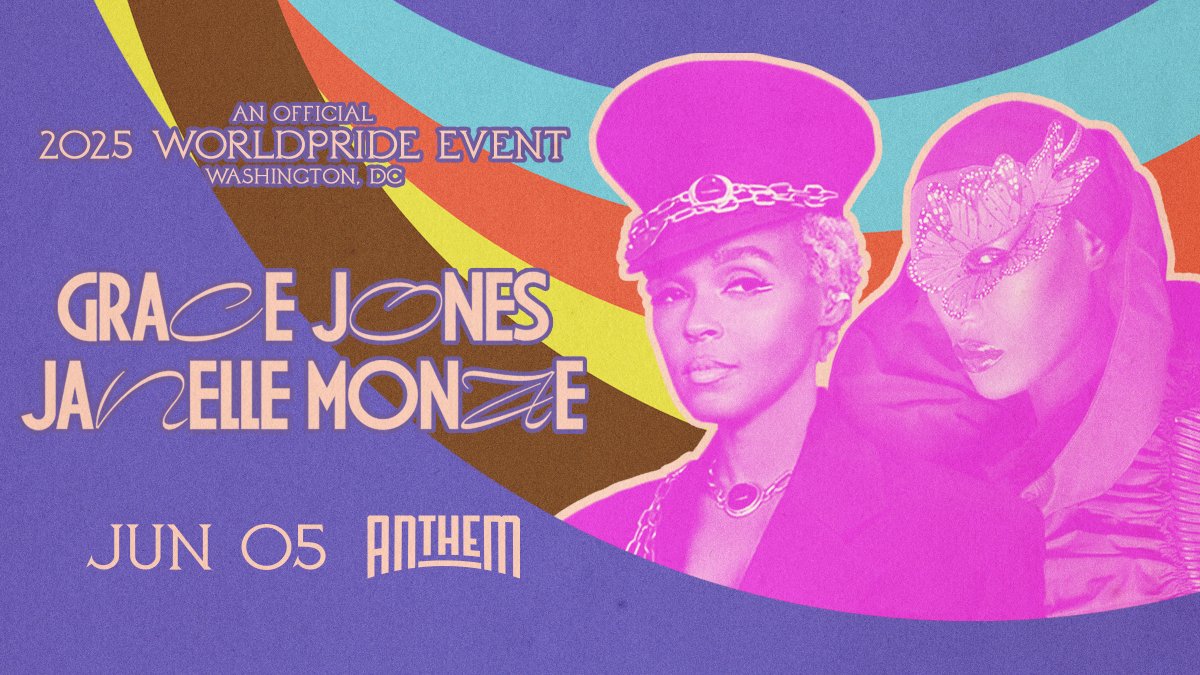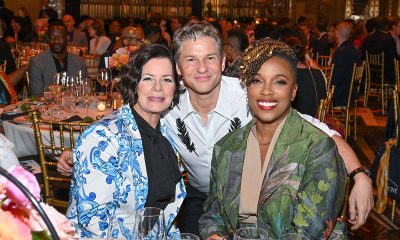Arts & Entertainment
‘If’ out, ‘Then’ what?
Broadway vet lets go of fear at home and on stage


Actress Jenn Colella in rehearsal for ‘If/Then.’ (Photo by Matthew Murphy; courtesy National Theatre)
‘If/Then’
Through Dec. 8
National Theatre
1321 Pennsylvania Avenue, NW
$53-$93
800-514-3849
Early in her acting career, Broadway’s Jenn Colella was counseled that it would be unwise for her to be out professionally. When casting directors see you as lesbian, her advisors reasoned, they become less likely to cast you in straight romantic leads.
There was a time, Colella says, when she would have been reluctant to portray a lesbian on stage much less talk about her sexuality openly. But in recent years her outlook has definitely changed.
Today Colella is out and proud. She’s also playing one half of a lesbian couple in the hotly anticipated Broadway-bound musical “If/Then,” currently premiering at National Theatre. Created by Tom Kitt (music) and Brian Yorkey (book and lyrics), and staged Michael Greif (the creative team behind the Tony Award-winning “Next to Normal”), “If/Then” tells the story of Elizabeth (“Wicked’s” green-faced wonder Idina Menzel), a woman on the precipice of middle age who returns to New York City to reboot her life. The heady cast also stars LaChanze, who won a Tony Award for her portrayal of Celie in “The Color Purple, and out actor Anthony Rapp (“Rent”).
“I’m thrilled to have the opportunity to play a gay character in ‘If/Then,’ especially someone like Anne,” says Colella, 39. “She’s a sassy fun-loving girl not unlike myself who’s in a relationship with Kate [LaChanze’s character]. Anne is madly in love and very sincere about taking it to the next level and actually tying the knot. It’s a very real look at a contemporary lesbian relationship. You don’t see a lot of that in musical theater.”
She says changing attitudes overall helped her loosen up.
“As I became older and wiser, and began noticing straight comrades realizing it was no longer fair to discriminate against gay and lesbian actors, being out got easier,” Colella says. “Also, I began to feel a responsibility to be out. I used to think it was entirely a personal choice, but now I think being out is also taking responsibility for others who may not have the courage to do so.”
Last year Colella was involved romantically with a male actor, but she doesn’t identify as bisexual because the vast majority of her relationships have been with women. Currently she is in a committed relationship with a woman who is studying for her master’s degree in midwifery.
Growing up in Summerville, S.C., Colella began singing early. She and mother frequently sang Barbra Streisand around the house, and while there weren’t many theatrical training opportunities in town, Colella took advantage of what was available.
“There was a woman who taught out of her garage, but my mom was a teacher and couldn’t afford the fees, so I traded odd jobs for classes. I was scrawny at 15 but I painted that lady’s entire house. And it was worth it. The group did ‘Oklahoma,’ and I got to play to Gertie.”
Before leaving South Carolina for the West Coast, she graduated from college and did some professional acting at the respected Trustus Theater in Columbia. She earned a master of fine arts in acting from the University of California, Irvine, and remained in L.A. determined to go the sitcom route. During this time, she got into standup.
“It was challenging. If you fail in standup you can’t blame anyone but yourself. But it definitely increased my confidence and now there’s really nothing that scares frightens me in terms of performance. Scarier were the fellow comics. They can be a dark bunch.”
Next Colella smartly reconsidered musical theater. In a high profile Broadway debut, she was cast as Sissy opposite Matt Cavenaugh in the musical “Urban Cowboy” in 2003. She went on to star in “High Fidelity,” and as Hedda Hopper in “Chaplin.” Her Off-Broadway credits include, among others, “Closer Than Ever” and “Slut.” She played Daisy in “Sideshow” at the Kennedy Center.
Prior to taking on “If/Then’s” Anne, Colella was cast as a lesbian just once before. In 2008 she starred off-Broadway as the title character in “The Beebo Brinker Chronicles” based on Ann Bannon’s pulp fiction novel about a young lesbian’s adventures in 1950s Greenwich Village.
“Beebo was a real butch,” Colella says. “I wore batteries in my front pockets to alter my center of gravity. My male and feminine energies are pretty equally balanced and in that way I’m more like Anne. But like Beebo, I have been accused of being a bit of a womanizer.”
Typically Colella does new work. Not by design, she says. It just happens that way.
“I’m honored that creators trust me to collaborate on their babies. It touches me deeply. Plus I get to start from a blank slate and play. Of all the characters I’ve ever played, Anne is the closest to who I am in the world. It makes me feel very vulnerable but I love it. I’m wide open to this experience.”
Arts & Entertainment
Win a pair of tickets to Grace Jones & Janelle Monáe @ The Anthem on June 5, 2025!


The Cherry Weekend main event party was “Fire” at Betty (1235 W Street, N.E.) on Saturday, April 12. Detox of “RuPaul’s Drag Race” met with fans.
(Washington Blade photos by Michael Key)















‘Uncle Vanya’
Through April 20
Shakespeare Theatre Company
Harman Hall
610 F St., N.W.
Shakespearetheatre.org
Shakespeare Theatre Company’s “Uncle Vanya” freshly rendered by director Simon Godwin and starring Hugh Bonneville in the title role, puts a pleasing twist on Chekhov’s tragicomic classic.
As disheveled, disheartened, and overworked Vanya, Bonneville is terrific. Though very different from the actor’s fame making role as Downton Abbey’s Lord Grantham, a proud, fastidiously turned-out aristocrat who presides over a manicured country estate peopled by a large staff, his Vanya is equally compelling
For “Uncle Vanya,” Chekhov imagines a house on a ragged estate in the Russian forest whose inhabitants display varying degrees of discontent brought on by the realization that they’re leading wasted lives. Middle-aged Vanya’s dissatisfaction and disappointment have been tempered by years of hard work. But all of that is about to be challenged.
With his plain and steadfast niece Sonya (Melanie Field), Vanya keeps the place going. And while barely putting aside a kopek for himself, he’s ensured that proceeds have gone to Sonya’s father Alexandre, a querulous academic (Tom Nelis), and his alluring, much younger second wife Yelena (Ito Aghayere) who live in the city.
When called to retire, the self-important professor and his wife economize by joining the family in the country. Overcome by the intense boredom brought on by provincial isolation, they’re not happy. Turns out, life in the sticks isn’t for them.
At the same time, the urban couple’s presence generates quite an effect on the rural household, changing the mood from one of regular work to idleness. What’s more, Vanya and family friend Mikhaíl Ástrov (John Benjamin Hickey), an unusually eco-aware, country doctor, are both bewitched by Yelena.
Meanwhile, young Sonya, who’s long carried an unrequited torch for Ástrov grows increasingly smitten. And while Yelena, who’s bored with her aging husband, expresses teasing tenderness with Vanya, she feels something more serious for Ástrov. It’s a whole lot for one house.
Superbly staged by Simon Godwin, STC’s artistic director, and performed by a topnotch cast, the very human production begins on an unfinished stage cluttered with costume racks and assorted props, all assembled by crew in black and actors in street clothes. We first see them arranging pillows and rugs for an outside scene. Throughout the play, the actors continue to assist with set changes accompanied by an underscore of melancholic cello strings.
With each subsequent scene, the work moves deeper into Chekhov’s late 19th century Russian world from the kitchen to the drawing room thanks in part to scenic designer Robert Brill’s subtle sets and Susan Hilferty and Heather C. Freedman’s period costumes as well as Jen Schriever’s emotive lighting design.
In moments of stillness, the set with its painterly muted tones and spare furnishings is a domestic interior from a moment in time. It’s really something.
Adapted by contemporary Irish playwright Conor McPherson, the work is infused with mordant wit, ribald comedy, and sadness. Like McPherson’s 2006 play “The Seafarer” in which the action unfolds among family, friends and others in a modest house filled with confrontation, laughter, resentment, and sadness. All on brand.
For much of “Uncle Vanya,” McPherson’s script leans into humor, funny slights, the professor’s pretentions, and Vanya’s delicious snarky asides; but after the interval, the play’s stakes become perilously heightened ready to explode with resentment and feelings of wasted potential, particularly frustrations expressed by Vanya and his intelligent but unfulfilled mother (Sharon Lockwood).
When it appears that mismatched couple Alexandre and Yelena are poised to depart, the house is struck with a sense of both relief and gloom.
Not everyone is disturbed. In fact, the family’s old nanny Nana (Nancy Robinette), and Waffles (Craig Wallace), a former landowner and now lodger on the estate, are elated. Both are eager to return to the pre-professor schedule of an early breakfast and midday lunch, and menus featuring simpler fare. They long for the return of the humble Russian noodle.
“Uncle Vanya”melds cynicism and hope. Like life, it’s a grasp at fulfillment.
-

 District of Columbia5 days ago
District of Columbia5 days agoWorldPride organizers may warn trans people from abroad not to attend event
-

 Opinions4 days ago
Opinions4 days agoIt’s time for new leadership on the Maryland LGBTQIA+ Commission
-

 The White House3 days ago
The White House3 days agoWhite House does not ‘respond’ to reporters’ requests with pronouns included
-

 Noticias en Español4 days ago
Noticias en Español4 days agoINDIGNACIÓN: ¡El transfeminicidio de Sara Millerey en Colombia nos cuestiona como sociedad!












